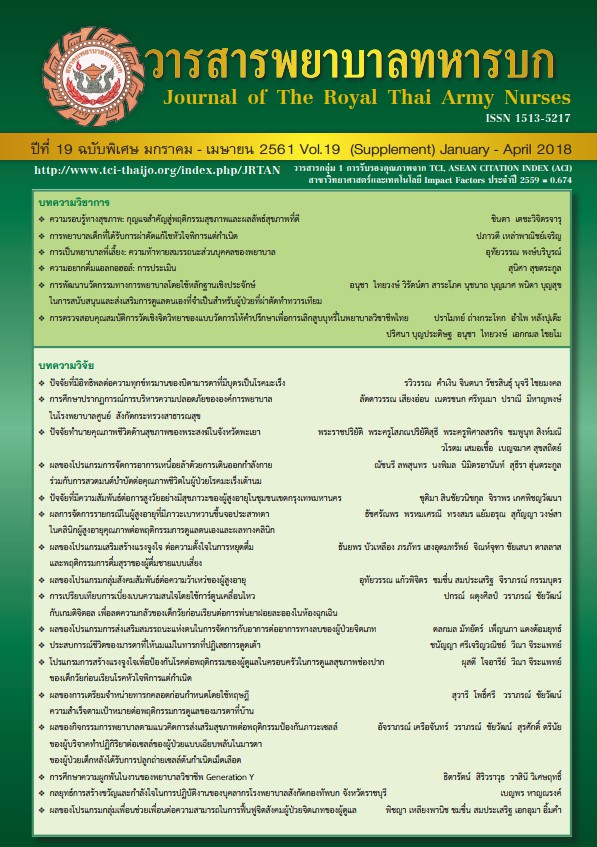The Effects Of A Mindfulness Based Practice On Stress Among Inmates
Keywords:
inmates, stress, mindfulness programAbstract
This quasi experimental research aimed to examine the effects of a mindfulness based practice on stress among inmates. The study sample consisted of 60 males and females who aged between 18-59 years and remand prison in Eastern prisons. They were randomly assigned to either experimental or control group (n = 30 in each group).The experimental group received mindfulness based practice for 8 weeks period. Participants in the control group received only routine care the prison center. The research instruments were the following: 1) a personal data questionnaire;. 2) The Mindfulness program; 3) The participant’s stress scores were measured using the self-analysis stress test. The peer support group program was validated for content validity by 3 professional experts and the mental health self-care scale, with a Cronbach alpha coefficient reliability of .81 Data were analyzed by descriptive statistics, dependent t-test, and independent t-test. Results showed that after receiving the mindfulness based practice; 1) The inmates in the experimental group had decrease in the mean of the stress score (M = 14.86, S.D = 1.942) than the pre-test mean scores (M = 26.63, SD = 2.44) (t = 25.36, p<.001). Furthermore, 2) The mean difference between pre-test and post-test stress score of the inmates in the experimental group ( 1 = -11.766, SD = 2.54) was higher than the mean difference of the control group receiving routine care ( 2 = 1.90, SD = 3.30) (t = 12.96, p<.001). Thus, the result of this study could be used as an alternative for designing and intervention program aiming on stress for the inmates.
Downloads
References
2. The Department of Corrections. Statistics for the prosecution drug addicts nationwide 2015. (In Thai)
3. Phakon B. Factors affecting stress on the prisoners in Bangkok remand prision. (Department of Social Work). Thammasat University. Faculty of social administration Criminal justice administration 2009. (In Thai)
4. Ahmad, A, & Mazlan, N. Stress and Depression: A Comparison Study between Men and Women Inmates in Peninsular Malaysia. International Journal of Humanities and Social Science 2014; 4(2).
5. Majumdar,M.S., & Acharya,A. Mental Health Problem among Prison Population, Udaipur, Tripura. Indian Journal of Applied Research 2016; 6(4)
6. Mansoor, M., Perwez, S.K., Swamy,T., & Ramaseshan, H. A Critical Review on Role of Prison Environment on Stress and Psychiatric Problems among Prisoners. Mediterranean Journal of Social Sciences 2015; 6 (1 S1), 218.
7. Maschi, T., Viola, D., Morgen, K., & Koskinen, L. Trauma, stress, grief, loss, and separation among older adults in prison: the protective role of coping resources on physical and mental well-being. Journal of Crime and Justice 2015; 38(1), 113-136.
8. Phramahamontree L. The study of stress and reduction of prisoners’s stress from daily life in jail by group counseling based on the four noble truths.( The degree of master) Srinakharinwirot University. Faculty of Education. The education degree in guidance 2008. (In Thai)
9. Sharma, O. P., Sengar, K., & AR Singh, N. A Study of Mental Health Problems in Criminals in Terms of Depression, Anxiety and Stress. Global Journal of Human-Social Science Researchv 2015; 15 (9).
10. Blevins, K.R., Listwan, S.J., Cullen, F.T., & Jonson, C.L. A general strain theory of prison violence and misconduct: An integrated model of inmate behavior.Journal of Contemporary Criminal Justice 2010; 26(2): 148-166.
11. Samuelson, M., Carmody, J., Kabat-Zinn, J., & Bratt, M. A. Mindfulness-based stress reduction in Massachusetts correctional facilities. The Prison Journal 2007; 87(2):254-268.
12. Lazarus, R. Folkmans., Stress, appraisal and coping. New York: Springer 1984.
13. Harner, H. M., & Riley, S. The impact of incarceration on women’s mental health responses from women in a maximum-security prison. Qualitative health research 2013; 23(1):26-42.
14. Rivlin, A., Hawton, K., Marzano, L., & Fazel, S. Psychiatric disorders in male prisoners who made near-lethal suicide attempts: case–control study. The British Journal of Psychiatry 2010; 197 (4).
15 Elger,B.S. Prison life: Television, sports, work, stress and insomnia in a remand prison. International Journal of Law and Psychiatry 2009; 32(2):74-83.
16. Somphot R. Textbook Psychiatry. Bangkok. Raunkaew printing 2014. (in Thai)
17. Dutsadee J. Yada T. Pariya P. Praneet ., & C. Prawate T. The efficacy of group mindfulness-based cognitive therapy in prevention of youth depression;a pilot study. Journal of mental health of Thailand 2015; 23(3):143-153. (In Thai)
18. Williams-McGahee, P. Mindfulness Meditation: A Practical Intervention in addressing stress and anxiety in inmates. Counselor education capstone. Paper 19. State University of New York. 2015
19. Yongyud W. Mindfulness therapy guide. Centra by Centara Government Complex Hotel & Convention Centre Chaeng Watthana, room BB206 floor 2, Mindfulness–Based Therapy and Counselling; 2015. Bangkok: (in Thai)
20. Kabat-Zinn, J. Full catastrophe living : Using the wisdom of your body and mind to face stress, pain, and illness. Random House, New York. 2013.
21. Himelstein, S., Hastings, A., Shapiro, S., & Heery, M. Mindfulness training for self-regulation and stress with incarcerated youth A pilot study. Probation Journal 2012; 59(2),151-165.
22. Mom luang Somchai J. Kanjana W. Laeud S. Wanchi C. Supin P. Sujittra U. Aumpai T & Nakorn T. Development of Thai Computerized Self-Analysis Stress Test. (2547)
23. Ferszt, G.G., Miller, R.J., Hickey, J.E., Maull, F., & Crisp, K. The Impact of a mindfulness based program on perceived stress, anxiety, depression and sleep of incarcerated women. International journal of environmental research and public health 2015; 12(9): 11594-11607.
24. Xu, W., Jia, K., Liu, X., & Hofmann, S. G. The Effects of Mindfulness Training on Emotional Health in Chinese Long-Term Male Prison Inmates. Mindfulness 2016; 7(5):1044-1051.
25. Maleewan L. The Effectiveness of Meditation Program toward Multiple Intelligences among the First Year Students at Saint Louis College Journal of The Royal Thai Army Nurses. 2016; 17(3):44-53. (in thai)
Downloads
Published
How to Cite
Issue
Section
License
บทความหรือข้อคิดเห็นใดใดที่ปรากฏในวารสารพยาบาลทหารบกเป็นวรรณกรรมของผู้เขียน ซึ่งบรรณาธิการหรือสมาคมพยาบาลทหารบก ไม่จำเป็นต้องเห็นด้วย
บทความที่ได้รับการตีพิมพ์เป็นลิขสิทธิ์ของวารสารพยาบาลทหารบก
The ideas and opinions expressed in the Journal of The Royal Thai Army Nurses are those of the authors and not necessarily those
of the editor or Royal Thai Army Nurses Association.






